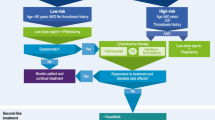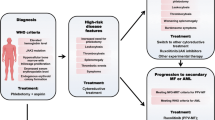Abstract
Polycythemia vera (PV) is a chronic myeloproliferative neoplasm (MPN) characterized by excessive production of red blood cells. Patients with PV are at a risk of thrombosis, bleeding, and transformation to myelofibrosis or acute myeloid leukemia. Therapy for PV is based on the use of phlebotomy, aspirin, and in high-risk patients, cytoreductive agents such as hydroxyurea. Anecdotal evidence suggests that imatinib mesylate, a selective tyrosine kinase inhibitor of ABL1, ARG, PDGFR, and KIT kinases has activity in PV. We conducted an open-label phase II clinical trial of imatinib at the standard dose of 400 mg daily in 24 patients with PV. The median duration of imatinib therapy was 5.1 months (range 0.2–86.4). Overall, 4 (17%) patients responded: one had a complete and three partial hematological response. The median time to response was 17.5 months (range 6–28), and the median duration of response was 17 months (range 9–68). No significant changes in JAK2V617F mutation burden were noted during imatinib therapy when compared with pretreatment values (P = 0.46). Therapy with imatinib was generally well tolerated. Our data indicate that imatinib has minimal clinical activity in PV.


Similar content being viewed by others
References
Prchal JF, Prchal JT. Molecular basis for polycythemia. Curr Opin Hematol. 1999;6(2):100–9. doi:10.1097/00062752-199903000-00008.
Prchal JF, Axelrad AA. Letter: bone-marrow responses in polycythemia vera. N Engl J Med. 1974;290(24):1382.
Druker BJ, et al. Activity of a specific inhibitor of the BCR-ABL tyrosine kinase in the blast crisis of chronic myeloid leukemia and acute lymphoblastic leukemia with the Philadelphia chromosome. N Engl J Med. 2001;344(14):1038–42. doi:10.1056/NEJM200104053441402.
Cortes J, Kantarjian H. Beyond chronic myelogenous leukemia: potential role for imatinib in Philadelphia-negative myeloproliferative disorders. Cancer. 2004;100(10):2064–78. doi:10.1002/cncr.20211.
Oehler L, et al. Imatinib mesylate inhibits autonomous erythropoiesis in patients with polycythemia vera in vitro. Blood. 2003;102(6):2240–2. doi:10.1182/blood-2003-03-0676.
Gaikwad A, et al. Imatinib effect on growth and signal transduction in polycythemia vera. Exp Hematol. 2007;35(6):931–8. doi:10.1016/j.exphem.2007.03.012.
Jones CM, Dickinson TM. Polycythemia vera responds to imatinib mesylate. Am J Med Sci. 2003;325(3):149–52. doi:10.1097/00000441-200303000-00007.
Silver RT. Imatinib mesylate (Gleevec(TM)) reduces phlebotomy requirements in polycythemia vera. Leukemia. 2003;17(6):1186–7. doi:10.1038/sj.leu.2402938.
Silver RT. Treatment of polycythemia vera with recombinant interferon alpha (rIFNalpha) or imatinib mesylate. Curr Hematol Rep. 2005;4(3):235–7.
Spivak JL, Silver RT. Imatinib mesylate in polycythemia vera. Blood. 2004;103(8):3241. doi:10.1182/blood-2003-12-4248. author reply 3241–3242.
Baxter EJ, et al. Acquired mutation of the tyrosine kinase JAK2 in human myeloproliferative disorders. Lancet. 2005;365(9464):1054–61.
James C, et al. A unique clonal JAK2 mutation leading to constitutive signalling causes polycythaemia vera. Nature. 2005;434(7037):1144–8. doi:10.1038/nature03546.
Kralovics R, et al. A gain-of-function mutation of JAK2 in myeloproliferative disorders. N Engl J Med. 2005;352(17):1779–90. doi:10.1056/NEJMoa051113.
Levine RL, et al. Activating mutation in the tyrosine kinase JAK2 in polycythemia vera, essential thrombocythemia, and myeloid metaplasia with myelofibrosis. Cancer Cell. 2005;7(4):387–97. doi:10.1016/j.ccr.2005.03.023.
Lacout C, et al. JAK2V617F expression in murine hematopoietic cells leads to MPD mimicking human PV with secondary myelofibrosis. Blood. 2006;108(5):1652–60.
Jones AV, et al. Widespread occurrence of the JAK2 V617F mutation in chronic myeloproliferative disorders. Blood. 2005;106(6):2162–8. doi:10.1182/blood-2005-03-1320.
Verstovsek S, et al. JAK2V617F mutational frequency in polycythemia vera: 100%, >90%, less? Leukemia. 2006;20(11):2067. doi:10.1038/sj.leu.2404379.
Nussenzweig RH, et al. Polycythemia vera is not initiated by JAK2V617F mutation. Exp Hematol. 2007;35(1):32–8.
Druker BJ, et al. Effects of a selective inhibitor of the Abl tyrosine kinase on the growth of Bcr-Abl positive cells. Nat Med. 1996;2(5):561–6. doi:10.1038/nm0596-561.
Zhao R, et al. Identification of an acquired JAK2 mutation in polycythemia vera. J Biol Chem. 2005;280(24):22788–92. doi:10.1074/jbc.C500138200.
Weiler SR, et al. JAK2 is associated with the c-kit proto-oncogene product and is phosphorylated in response to stem cell factor. Blood. 1996;87(9):3688–93.
Fontalba A, et al. Identification of c-Kit gene mutations in patients with polycythemia vera. Leuk Res. 2006;30(10):1325–6. doi:10.1016/j.leukres.2005.12.020.
Zaleskas VM, et al. Molecular pathogenesis and therapy of polycythemia induced in mice by JAK2 V617F. PLoS One. 2006;1:e18. doi:10.1371/journal.pone.0000018.
Silver R, Fruchtman S, Feldman E, et al. Imatinib mesylate (Gleevec) is effective in the treatment of polycythemia vera: a multi-institutional clinical trial. Blood. 2004;104(11):189a.
Jones CM, Dickinson TM, Salvado A. Phase II open label trial of imatinib in polycythemia rubra vera. Int J Hematol. 2008;88(5):489–94. doi:10.1007/s12185-008-0193-1.
Jones AV, et al. Minimal molecular response in polycythemia vera patients treated with imatinib or interferon alpha. Blood. 2006;107(8):3339–41. doi:10.1182/blood-2005-09-3917.
Quintas-Cardama AC, J, Kantarjian H. Practical management of toxicities associated with tyrosine kinase inhibitors in chronic myeloid leukemia. Clin Lymphoma Myeloma. 2008;8(Suppl. 3):S82–8. doi:10.3816/CLM.2008.s.003.
Author information
Authors and Affiliations
Corresponding author
About this article
Cite this article
Nussenzveig, R.H., Cortes, J., Sever, M. et al. Imatinib mesylate therapy for polycythemia vera: final result of a phase II study initiated in 2001. Int J Hematol 90, 58–63 (2009). https://doi.org/10.1007/s12185-009-0345-y
Received:
Revised:
Accepted:
Published:
Issue Date:
DOI: https://doi.org/10.1007/s12185-009-0345-y




